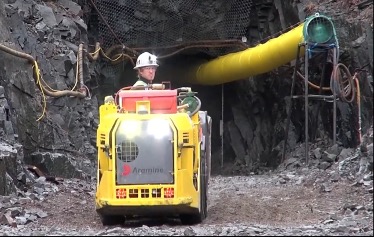Canada Silver Cobalt Works Inc. (TSXV: CCW) will utilise two tonnes of high-grade mineralised material recovered during voluntary surface site rehabilitation at the past-producing Castle and Beaver Mines, in addition to high-grade silver tailings from the mines, for processing at the company’s Temiskaming Testing Labs (TTL) high-grade bulk processing facility in nearby Cobalt, Ontario.
“Having met with South Korean EV metal buyers last week and with the TTL bulk processing facility fully commissioned, including the newly installed gravity processing plant, we have begun processing two bulk samples totalling approximately two tonnes mineralised rock recovered from the waste piles and high-grade silver tailings at our Castle and Beaver Mines,” CEO, Frank Basa, said.
“We are doing this to produce a concentrate we can use for further testing of our Re-2Ox process and also to demonstrate the role that the upgraded TTL facility can play in processing high-grade mineralized material from the Cobalt Camp.”
At TTL, the waste rock material will first be crushed and ground before being screened at 20 mesh to recover potential native silver for processing into silver dore bars using the facility’s bullion furnace.
The remaining sulphide material will then pass through the gravity plant to produce a high-grade gravity concentrate, which will be assayed for cobalt, nickel, copper, silver, gold and arsenic (arsenic is one of the metals the US have on their critical metals list).
The high-grade silver tailings will be first screened at 20 mesh to remove any organics and then processed through the TTL gravity plant to produce a concentrate.
The company plans to send these high-grade gravity concentrates to SGS Canada’s laboratory facility in Lakefield, Ontario where, using the company’s proprietary Re-2Ox process, they will be converted into battery metals needed in the EV industry.
In 2018, the environmentally friendly Re-2Ox process was used at SGS Lakefield to produce a technical-grade cobalt sulphate hexahydrate at 22.6%, directly from cobalt-rich gravity concentrates produced from mineralised material removed from the first level of the Castle mine.
The 22.6% cobalt sulphate compound exceeded the specifications required at that time by battery manufacturers including Japan’s Sumitomo Metals.
The gravity concentrates used for this had graded 9.25% cobalt, 5.65% nickel, 49.9% arsenic and 9.25 g/t silver. The Re-20x process recovered 99% of the cobalt and 81% of the nickel from the concentrate while also removing 99% of the arsenic – a long-time issue in the cobalt-rich Cobalt Camp but now a critical metal.
The company regards the proprietary Re-2Ox process as a long-term strategic advantage that will facilitate the production of battery metals for the EV market for many years. It is a closed-loop, zero-discharge hydrometallurgical process with no smelting or burning involved, which can meet stringent Canadian and International environmental standards and traceable verification.
It is, additionally, more energy efficient than existing processes which use smelting and could have the potential to be used widely in base metals processing especially where high amounts of arsenic are present.
For further information please visit: https://www.canadasilvercobaltworks.com/












